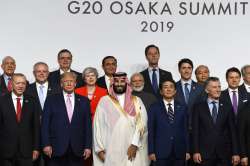G20 leaders resolve to prevent use of internet for terrorism, extremism
The leaders of the Group of 20 major economies in a statement after the Osaka summit said they are committed to protecting people from terrorist and violent extremism conducive to terrorism (VECT) exploitation of the internet.

Prime Minister Narendra Modi and other leaders of the G20 on Saturday resolved to prevent the use of the internet to fund and facilitate terrorism and extremism, asserting that while the internet must be "open, free and secure", it cannot serve as a safe haven for terrorists.
The leaders of the Group of 20 major economies in a statement after the Osaka summit said they are committed to act to protect people from terrorist and violent extremism conducive to terrorism (VECT) exploitation of the internet.
"As leaders, one of our greatest responsibilities is to ensure the security of our citizens. It is the state's role, first and foremost, to prevent and combat terrorism. Here in Osaka, we reaffirm our commitment to act to protect our people from terrorist and VECT exploitation of the internet," they said in a separate statement.
"We issue this statement to raise the bar of expectation for online platforms to do their part. We, the leaders of the G20, reaffirm our strongest condemnation of terrorism in all its forms and manifestations," they said.
The G20 leaders said the live-streamed Christchurch terrorist attacks in New Zealand that killed 51 people, and other recent atrocities, demonstrate the urgency with "which we must fully implement relevant UN resolutions, the UN Global Counter-Terrorism Strategy and other instruments, including the 2017 Hamburg G20 Leaders’ Statement on Countering Terrorism."
The leaders, however, agreed that such efforts must respect human rights and "fundamental freedoms such as freedom of expression and access to information."
They said the internet must not be a safe haven for terrorists to recruit, incite or prepare terrorist acts.
"To this end, we urge online platforms to adhere to the core principle, as affirmed in Hamburg, that the rule of law applies online as it does offline.
This must be achieved in a way that is consistent with national and international law, including human rights and fundamental freedoms such as freedom of expression and access to information - we hold these in high regard. We commit to collaborate with states, international organisations, industry, and civil society in this endeavour," they said.
In the declaration issued after the summit, the leaders reaffirmed their commitment to applying the recently amended Financial Action Task Force (FATF) standards to virtual assets and related providers for anti-money laundering and countering the financing of terrorism.
They welcomed the UN Security Council Resolution 2462, which stresses the essential role of the FATF in setting global standards for preventing and combatting money laundering, terrorist financing and proliferation financing.
"We reiterate our strong commitment to step up efforts to fight these threats,
including by strengthening the FATF’s global network of regional bodies. We call for the full, effective and swift implementation of the FATF Standards," the declaration said.
ALSO READ | G20 Summit: PM Modi hard sells Yoga, India's traditional healing measures
ALSO READ | G20 Summit: PM Modi meets Turkish President in Japan; holds talks on counter-terrorism, defence